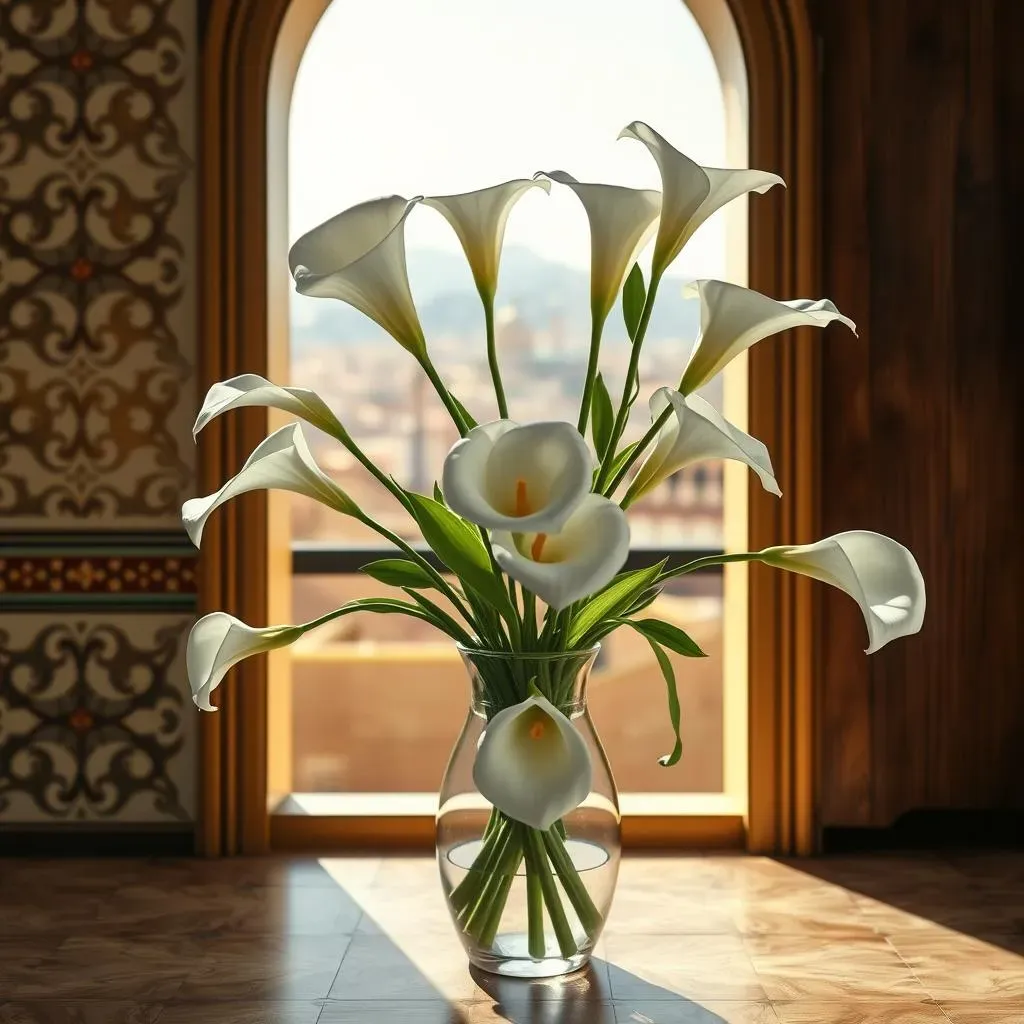Table of Contents
Have you ever wondered what the elegant calla lily is called in Spanish? It's more than just a simple translation; it's a journey into the diverse linguistic landscape of Spanish-speaking countries. This article will guide you through the fascinating world of the "calla lily flower in spanish," exploring its various names and uncovering the regional nuances that make each term unique. We'll travel from country to country, discovering the common names and less-known regional variations, and even delve into the cultural significance of this beautiful flower in different Spanish-speaking communities. Prepare to be surprised by the richness and variety of terms used to describe this iconic bloom, and gain a deeper appreciation for the beauty and complexity of the Spanish language. Get ready to expand your botanical vocabulary and discover a new level of appreciation for the calla lily's global appeal. Let's embark on this exciting linguistic adventure together!
The Many Names of the Calla Lily: A SpanishSpeaking World Tour

The Many Names of the Calla Lily: A SpanishSpeaking World Tour
Common Names Across Borders
So, you're diving into the world of calla lilies in Spanish? Fantastic! It's a surprisingly diverse topic. In many parts of the Spanish-speaking world, you'll find the calla lily simply called a "cala." It's straightforward, elegant, and widely understood. Think of it as the universal term, your go-to when you're unsure which specific regional name to use. It's a great starting point, but remember, the beauty of language lies in its variations.
However, don't let the simplicity of "cala" fool you. The world of calla lilies in Spanish is far richer than just one word. Different regions have their own unique names, reflecting local traditions, cultural influences, and even historical quirks. For example, in Mexico, you might encounter "alcatraz," a name that evokes a slightly different image, perhaps a wilder, more untamed flower. This name comes from the flower's resemblance to the alcatraz bird, known for its striking appearance. Learn more about Calla Lily facts This highlights how the same flower can be perceived and named quite differently across various cultures and regions.
Country/Region | Common Name(s) | Notes |
|---|---|---|
Spain | Cala | Most common and widely accepted |
Mexico | Alcatraz, Cala | "Alcatraz" is a more regional term |
Other regions | Variations exist! | Further research required per region. |
Let's not forget the scientific name, *Zantedeschia aethiopica*. While not a common name for everyday conversation, it's essential for botanists and those interested in the formal classification of plants. This name provides a level of precision that colloquial names often lack. Using the scientific name ensures everyone is on the same page, regardless of language or regional variations. Discover more about the Calla Lily's anatomy Knowing both the common and scientific names will give you a more comprehensive understanding of this beautiful flower.
One thing I find particularly interesting is how the image of the calla lily can influence its name. In some regions, the flower's elegant, almost regal appearance might be reflected in its name, giving it a more sophisticated or formal title. In others, a more whimsical or playful name might be chosen, reflecting a different cultural perspective on the flower’s aesthetic qualities. This diversity illustrates the fascinating interplay between language, culture, and perception.
- Scientific Name: *Zantedeschia aethiopica*
- Common Name (Widely Used): Cala
- Regional Variations: Numerous, requiring further investigation!
Beyond the Basics: Exploring Regional Variations and Nuances

Beyond the Basics: Exploring Regional Variations and Nuances
Delving Deeper into Regional Names
Okay, so we've covered the basics – "cala" is your friend. But the fun *really* starts when we look at the regional variations. Think of it like this: imagine a delicious cake. "Cake" is the basic term, but then you have chocolate cake, carrot cake, red velvet cake – each with its own unique flavor and appeal. Calla lilies in Spanish are much the same. While "cala" works in many places, you'll find delightful surprises as you explore further.
For example, in some parts of South America, you might hear "cartucho blanco," literally translating to "white cartridge." This evocative name paints a picture of the flower’s shape and color, highlighting its elegant, almost pristine appearance. The image it conjures is quite different from the simplicity of "cala," isn't it? This shows how a name can reflect a specific cultural understanding and appreciation for the flower’s visual characteristics. Want to learn more about how to arrange these beauties? Check out our guide on calla lily flower arrangements.
- Cala (General)
- Cartucho Blanco (South America)
- More regional names await discovery!
The Influence of Local Flora and Culture
The names used for calla lilies often reflect the local flora and cultural context. Imagine a region where another white flower is incredibly common. The calla lily, being similar in color, might be given a name that distinguishes it from its more prevalent cousin. This creates a unique naming convention specific to that area, emphasizing the flower's unique characteristics within its local environment. It’s a beautiful example of how language adapts and evolves to reflect the environment and the experiences of its speakers.
Consider the impact of historical events or cultural trends. Perhaps a particular calla lily variety was introduced during a specific historical period, leading to its association with that era. The name might reflect this historical connection, adding a layer of cultural significance to its simple botanical identity. It's like a little historical footnote embedded in the name itself. For unique arrangement ideas, check out our calla lily flower arrangement ideas page.
Region | Possible Naming Influence | Example (Hypothetical) |
|---|---|---|
Andean Region | Local white flower | "Lirio de la montaña blanca" (White mountain lily) |
Caribbean Island | Historical event | "Flor de la revolución" (Flower of the revolution) |
Uncovering the Nuances: A Call to Action
This exploration of regional variations is just the beginning! The beauty of this topic is that it’s constantly evolving and expanding. There's so much more to discover about the diverse ways the calla lily is named and perceived in Spanish-speaking communities. It’s a testament to the richness and adaptability of language itself.
I encourage you to explore further. Talk to native speakers, research regional dialects, and dive deep into local botanical guides. Each new name you discover will add another layer to your understanding of the calla lily and the cultures that have embraced its beauty. Share your findings! Let's build a comprehensive resource together, celebrating the diversity of the "calla lily flower in spanish."
Remember, the journey of discovery is as important as the destination. Embrace the unexpected, and let your curiosity guide you!
Calla Lilies in Culture and Art: A Deeper Dive into SpanishSpeaking Traditions

Calla Lilies in Culture and Art: A Deeper Dive into SpanishSpeaking Traditions
Calla Lilies in Spanish Art and Symbolism
Now, let's shift our focus from just the names to the cultural significance of calla lilies in Spanish-speaking regions. It's a fascinating area, revealing how this flower transcends its botanical identity and takes on symbolic meaning within different artistic traditions. Think of how certain flowers represent specific emotions or ideas in different cultures – for example, the rose often signifies romance in many Western cultures. Calla lilies hold similar symbolic weight in many Spanish-speaking countries, often associated with purity, elegance, and even rebirth. Their elegant shape and often pristine white color contribute to this symbolic meaning. Want to learn how to care for your calla lilies? Check out our tips on calla lily flower care.
For example, you'll often find calla lilies depicted in paintings and other visual art forms across the Spanish-speaking world. They might appear in still-life paintings, symbolizing the beauty of nature, or incorporated into more narrative works, representing purity or innocence. The way artists choose to portray the flower can significantly influence its symbolic meaning within the artwork itself. Consider the color of the calla lily depicted – a vibrant yellow calla might represent joy and optimism, while a deep purple might signify mystery or sophistication. This interplay between the flower's inherent beauty and the artist's interpretation creates a rich tapestry of symbolic meaning.
- Purity
- Elegance
- Rebirth
- Beauty of Nature
Beyond visual arts, explore the use of calla lilies in literature and poetry. How are they described? What emotions or ideas are they associated with? Finding literary references can reveal a deeper cultural understanding of the flower's symbolism and its place within the Spanish literary imagination. The descriptions might vary based on the time period, the author's style, and the specific context within the work. This demonstrates the dynamic and ever-evolving nature of symbolic meaning and how it's interpreted differently across time and by various artists.
Think about the impact of regional differences. Does the symbolism of calla lilies differ across various Spanish-speaking countries? Does the flower hold a more prominent role in some cultures than in others? Researching these regional differences will offer valuable insights into the flower's nuanced cultural significance. For stunning wedding arrangements, see our calla lily arrangements for weddings gallery.
Artistic Medium | Potential Symbolic Meaning | Example (Hypothetical) |
|---|---|---|
Painting (Still Life) | Tranquility, natural beauty | A painting featuring calla lilies alongside other flowers in a serene setting. |
Poetry | Innocence, new beginnings | A poem using calla lilies to symbolize the purity of a young love. |
Further Exploration: A Call to Deeper Research
This exploration of calla lilies in Spanish culture and art is just a starting point. There's a world of research waiting to be done, unlocking the rich tapestry of symbolism and meaning associated with this beautiful flower in the Spanish-speaking world. The more you delve into this topic, the more you'll discover the intricate connections between language, art, and culture.
Consider conducting further research into specific regions, artistic movements, and literary works to uncover more detailed information. Look for specific examples of calla lilies in paintings, sculptures, literature, and other art forms. Documenting these examples will help build a more comprehensive understanding of the flower's cultural significance. For those who love growing calla lilies, check out our guide on growing calla lilies in a garden.
- Research specific regional variations in symbolism.
- Analyze the use of calla lilies in different artistic movements.
- Explore literary works that feature calla lilies as significant symbols.